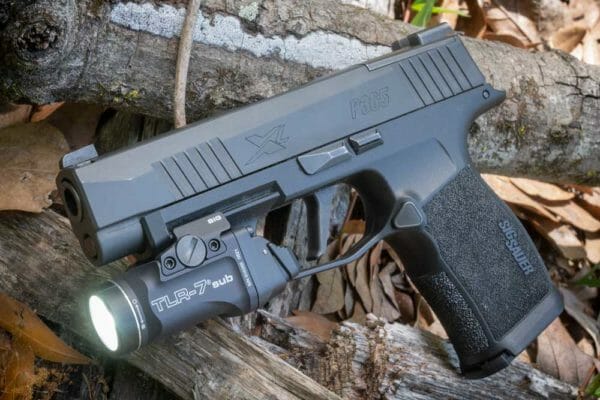
U.S.A. –-(AmmoLand.com)- Say “Aloha” to a requirement in Hawaii that a concealed carry permit applicant “show…reason to fear injury to the applicant’s person or property” in order to obtain a concealed carry license, according to a detailed opinion from State Attorney General Holly T. Shikada to Gov. David Y. Ige following the June 23 Supreme Court ruling in New York State Rifle & Pistol Association v. Bruen.
Ditto the requirement in California, where a legal alert issued by the office of Attorney General Rob Bonta advised all law enforcement agencies, “it is the Attorney General’s view that the Court’s decision renders California’s ‘good cause’ standard to secure a permit to carry a concealed weapon in most public places unconstitutional.
“Permitting agencies may no longer require a demonstration of ‘good cause’ in order to obtain a concealed carry permit,” the alert advised.
This hasn’t prevented lawmakers in both states from scurrying to find ways to dance around the high court ruling, which struck down New York State’s “good cause” requirement—anti-gunners may be dragged kicking and screaming into compliance—but the ruling amounted to a culture shock for the gun control crowd.
Hawaii and California are the only two western states now forced to drop the arbitrary “good cause” requirement. Both were specifically mentioned on Page 5 of the ruling, which noted, “Aside from New York, then, only California, the District of Columbia, Hawaii, Maryland, Massachusetts, and New Jersey have analogues to the ‘proper cause’ standard.”
Maryland also quickly halted the “good cause” requirement, and Massachusetts is trying to be as narrow with its change as possible, though the Gun Owners’ Action League is currently playing hardball, according to Liberty Park Press.
Other western states—Alaska, Idaho, Nevada, Oregon and Washington—are already “shall issue” states and both Alaska and Idaho are “constitutional carry” states where no permit is required, though they are still issued for reciprocity purposes.
In Hawaii, AG Shikada notes in her letter to the governor, “Following Bruen, the chiefs of police may not constitutionally restrict both concealed and unconcealed (open) carry licenses only to those who demonstrate a ‘special need.’
“Following Bruen, the language in Hawaiʻi Revised Statutes (“HRS”) § 134-9 requiring that an applicant ‘[i]n an exceptional case . . . show reason to fear injury to the applicant’s person or property’ in order to obtain a concealed carry license should no longer be enforced. All other statutory requirements for obtaining a concealed carry license are unaffected by Bruen, and (except for the citizenship requirement as applied to lawful permanent residents and U.S. nationals remain in full force and effect.
“Assuming this approach to concealed carry licenses, Bruen does not require any change to the requirements established under HRS § 134-9 to obtain an unconcealed carry license. An applicant for an unconcealed carry license must still ‘sufficiently indicate’ that he or she has an ‘urgency’ or ‘need’ to carry a firearm and is “engaged in the protection of life and property,” along with any other statutory requirements that must be satisfied under Hawaiʻi law to obtain an unconcealed carry license (except for the citizenship requirement as applied to lawful permanent residents and U.S. nationals. The standards that the chiefs of police should apply in considering applications for unconcealed carry licenses are discussed in Attorney General Opinion No. 18-1.”
Later in the Shikada letter, she reiterates, “The chiefs of police should not deny an application for a concealed carry license, or impose restrictions on a concealed carry license, because an applicant fails to demonstrate a special need or a sufficiently good reason to carry a firearm.”
However, she does assert, “The chiefs of police should also still require that applicants for a concealed carry license ‘[a]ppear to be a suitable person to be so licensed.’
“Being ‘a suitable person’ means that the applicant does not exhibit specific and articulable indicia that the applicant poses a heightened risk to public safety. The chiefs of police may consider the following factors when determining whether an applicant displays specific and articulable indicia that the applicant poses a heightened risk to public safety, such that the applicant is not ‘a suitable person to be so licensed’:
- Whether the applicant has been involved in recent incidents of alleged domestic violence;
- Whether the applicant has been involved in recent incidents of careless handling or storage of a firearm;
- Whether the applicant has been involved in recent incidents of alcohol or drug abuse;
- Whether the applicant has been involved in other recent violent conduct.”
In Bonta’s California alert, it states clearly, “In accordance with Bruen, the Attorney General now considers the ‘good cause’ requirements set forth in California Penal Code sections 26150(a)(2) and 26155(a)(2) to be unconstitutional and unenforceable. The immediate implications for law enforcement agencies that issue public-carry licenses (‘issuing authorities’) are as follows:
“First, effective immediately, issuing authorities should no longer require proof of good cause for the issuance of a public-carry license. Issuing authorities may still inquire into an applicant’s reasons for desiring a license to the extent those reasons are relevant to other lawful considerations, but denial of a license for lack of ‘good cause’ now violates the Second and Fourteenth Amendments under the Supreme Court’s decision in Bruen.
“Second, issuing authorities should continue to apply and enforce all other aspects of California law with respect to public-carry licenses and the carrying of firearms in public. Issuing authorities are still required to take an applicant’s fingerprints and to wait for the results of the background check that is run by the California Department of Justice (DOJ). Licenses ‘shall not be issued if the [DOJ] determines that the person is prohibited by state or federal law from possessing, receiving, owning, or purchasing a firearm.’ Cal. Pen. Code § 26195(a). Moreover, because the Court’s decision in Bruen does not affect the other statutory requirements governing public-carry licenses, issuing authorities must still require proof that (1) ‘the applicant is of good moral character,’ (2) the applicant is a resident of the relevant county or city (or has their principal place of business or employment in that county or city), and (3) the applicant has completed a course of training. Id. §§ 26150(a), 26155(a). Issuing authorities may also still require psychological testing. Id. § 26190(f).”
None of this means easy sledding for gun owners in either state, but it does indicate the two states, perhaps grudgingly, realize they would be in a bind if they continue demanding proof of good cause to exercise a constitutionally-protected fundamental right.
That hasn’t stopped anti-gunners from complaining. Democrat Hawaii State Sen. Karl Rhoads told Spectrum News, “It’s a disaster. It moves us in the wrong direction.”
Rhoads said the Bruen decision “puts more pressure on us to do something, not specifically related to concealed carry but other ways of shoring up our gun laws.”
And the Los Angeles Times is reporting that anti-gun Gov. Gavin Newsom “has signed at least three major gun control measures into law to restrict access to the weapons and create an avenue for private citizens to sue the industry.”
The newspaper’s headline suggests a legal showdown is looming. Newsom has been eager to sign gun control measures, but according to the L.A. Times, Sam Paredes, executive director of the Gun Owners of California, some of these measures violated the First, Second and 14th Amendments.
“None of this stuff,” Paredes told the newspaper, “none of the bills that are going to the governor’s desk that he is going to sign pass that [constitutional] test, from our opinion. And I think we will find out in court if our opinion is correct.”
All this really means is that organizations fighting to restore the Second Amendment are still facing possibly years of litigation, and grassroots activists will have to continue challenging gun control legislation and work to unseat anti-gun politicians at all levels. It’s not time to be folding up tents and heading for home.
About Dave Workman
Dave Workman is a senior editor at TheGunMag.com and Liberty Park Press, author of multiple books on the Right to Keep & Bear Arms, and formerly an NRA-certified firearms instructor.

from https://ift.tt/6rMIAB3
via IFTTT

No comments:
Post a Comment